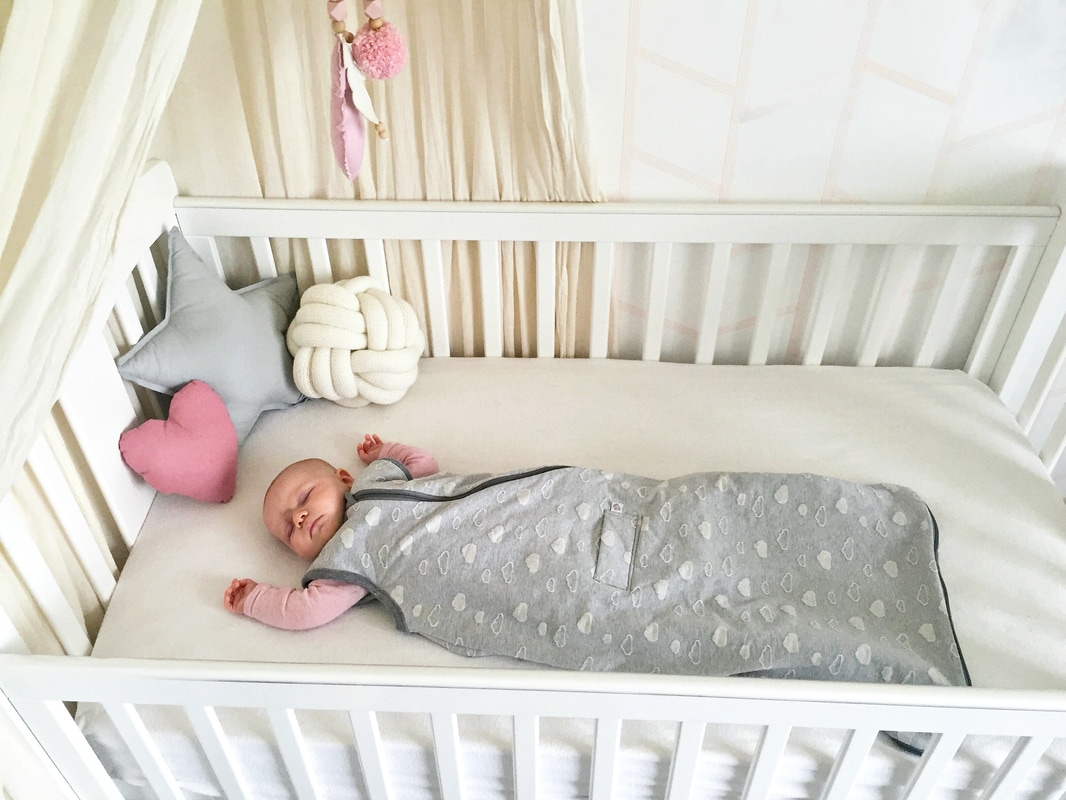|
We have all heard the expression ‘sleeping like a baby’ and most of us have never given this much thought, until we become parents. All of a sudden this phrase gets a completely different meaning as we realise our babies don’t "sleep like babies" at all! Or do they? To help sleep deprived parents and to normalise infant & toddler sleep patterns we have compiled some tips and tricks and we hope they are helpful. The best thing to keep in mind is there is no ‘fit-for-all’ solution and to go with the flow and do what works for you and your little one. 1. Calming Bedtime Routine.
Children need time to calm down and prepare for sleep. Having a consistent bedtime routine can be useful in giving your child cues that sleep time is coming. There are likely things that you do each night before bed, such as bath, massage, putting on pyjamas, brushing teeth, reading bedtime story, nursing or rocking, and so on. Try to do those things in the same order to help your child understand what is coming next and lean to wind down through that process. Also, create a calming environment during the bedtime routine. For example, turn off any bright lights (dimmers are great), television, and loud noises or exciting play at least an hour before bedtime. 2. Use a sleeping bag/swaddle Using a sleeping bag or a zip up swaddle in your bedtime routine provides a strong sleep cue. Your little one will soon start associating their comfy sleeping bag with sleep time! Another great benefit is familiarity. When going on holiday or staying with grandparents or even for daytime sleeps at day-care centres – using your babies sleeping bag will give them a sense of familiarity and will result in settling faster and better sleep. Studies have shown that babies sleeping in merino have more restful, longer sleeps and gain weight faster. Sleeping bags also promote safe sleep as there is no need for dangerous loose bedding. Using a ‘Hip-Healthy’ approved swaddle is a great and safe way to settle your little one and because swaddling your baby reduces the startle reflex and it will result in better sleep. 3. Lots of Fresh Air and Exercise This is one of the most important factors in determining how well your child sleeps at night. Aim for at least a couple of hours each day, even in cold climates, we recommend finding a way to get outside with your kids every day (bundle them up and go for several short trips outside if need be) and finding places for them to get exercise (playgrounds or parks are great for this, but other options include going for a walk around a museum or even the mall!). For babies it is great to spend time outside too – in pram, backpack or wrap – it is really beneficial for their sleep to get a daily dose of fresh air. If you find that your child has trouble sleeping – try and increase outside play time and see how well it translates into night time sleeping! 4. Check your little ones diet It is possible that something the baby is eating could be contributing to sleep problems. Some babies that are on formula have sensitivities to certain types and breastfed babies might react to what you are eating (more about this next). For babies that have started solids, food allergies or sensitivities can impact sleep – most common being dairy and gluten. Also, certain types of food (watch out for sugar loaded yoghurts!) consumed too close to bedtime can prevent good sleep. We recommend no sugary foods (like yoghurt, sweets or treats) after lunchtime and we suggest vegetables, fruit, good fats (think avocados), protein, grains and nuts instead. 5. Watch for irritants in mums diet If you are breastfeeding, then it is also worth considering whether something in your diet could be contributing to poor night time sleep. Usually breastfeeding mothers can eat whatever they like, but some infants are sensitive to certain things in Mums diet. Dairy is a frequent culprit and more obvious is your caffeine intake. 6. Consistent Napping Good sleep promotes good sleep. A lot of parents whose children do not sleep well at night mistakenly think it would be a good idea for them to give up naps. Instead it is better to institute a consistent nap routine. Make sure that babies last nap isn’t too late in the day to ensure that it doesn’t interfere with night time sleep. 7. Comfortable Sleep Environment Wherever your baby sleeps, ensure that it is comfortable. Make sure the room is dark (invest in some block out blinds!) and ideally the temperature should be between 18-20 degrees. Make sure your baby is dressed appropriately and you are using the right weight sleeping bag to eliminate the use of blankets which can be dangerous. Your babies sleep space should be a calm and inviting space that promotes relaxation and rest. Natural, breathable materials like merino, organic cotton and bamboo help keeping your little one at a comfortable temperature all through the night and reduce the risk of overheating. 8. Adjust your Expectations Babies and toddlers don’t sleep like adults – they wake – lots- and this is perfectly normal. Babies sleep cycles (and this lasts until after 2 years) is at about half the length of an adult sleep state. Now this makes perfect biological sense – it keeps our young offspring more alert should a predator threaten their life. What predator you might think? Unfortunately for now we still possess the same innate responses that kept our hunter gatherer predecessors safe even though circumstances have changed. Unfortunately our society puts an enormous amount of pressure on parents to have their little ones sleeping through the night and it completely discounts information on what normal infant sleep is. Instead of trying to fix your babies ‘sleep problems’ try and be patient and go with the flow. Understand that not every child is the same and also that a child that did once sleep well, might not always sleep well – and that’s ok and perfectly normal. Teething, growth spurts, sickness, milestones, hunger, a scary situation during the day and not enough exercise or fresh air or any list of other things, can wreak havoc on your little ones sleep. 9. Recognize that this too shall pass Our kids are only little for such a short period of time. It isn’t always easy dealing with the night waking or sleep deprivation and we know how frustrating it can be at times. It is important to realise that this too shall pass and things will get better. With age your child will start sleeping through the night and this is a skill that they will learn with time on their own. 10. Find Your Tribe Surround yourself with family and friends that are supportive, understanding and who can help you out when you are very tired. Accept help, meals and support. Even things like Mum-groups on Facebook can be very helpful for support! When you feel like there might be something else underlying that could interfere with your little ones sleep – visit a Cranial Osteopath and get them to do an assessment and a treatment. Quite often babies hugely benefit from this. And last but not least we advise to try and sleep when your baby or toddler sleeps. When you are very sleep deprived and you feel like things are getting too much – nap when your child naps - other things can wait!! It’s not the end of the world if your house is not as clean & tidy as it used to be. We have all been there and it’s totally ok. Helpful Gentle Sleep Books We hope our tips were helpful and we understand that you would love to read more about the fascinating topic of infant sleep! We highly recommend the range of Elizabeth Pantley’s “No-Cry” series and also The Gentle Sleep Book by Sarah Ockwell-Smith. These books offer valuable tips and information. And most importantly they normalise and help you understand what baby and toddler sleep is. For more info on how to keep your little one warm and snug at night click here.
0 Comments
|
Author
Kim is the owner of SNUGBAGS - Merino for Kids. Together with her partner James and their little girl Neeva Rose, she lives in a little beach town called Piha on the West Coast in New Zealand. They love surfing, building sandcastles and all things natural and organic. Categories
All
Archives
October 2021
|
|
Online shopping with us
> Shipping > Guarantee & Returns > Product Videos > SNUGBAG selector tool > Privacy policy > Farm to SNUGBAGS |
Our Products
> Our Merino > Our Organic Cotton > FAQ > Washing & Care > Pediatrician Endorsed > Intellectual Property |
Customer Service
NZ: 0272 761175 Int: +64 272 761175 [email protected] > Contact Us > Our Journal > Become a VIP! |
© copyright 2022 SNUGBAGS


 RSS Feed
RSS Feed
